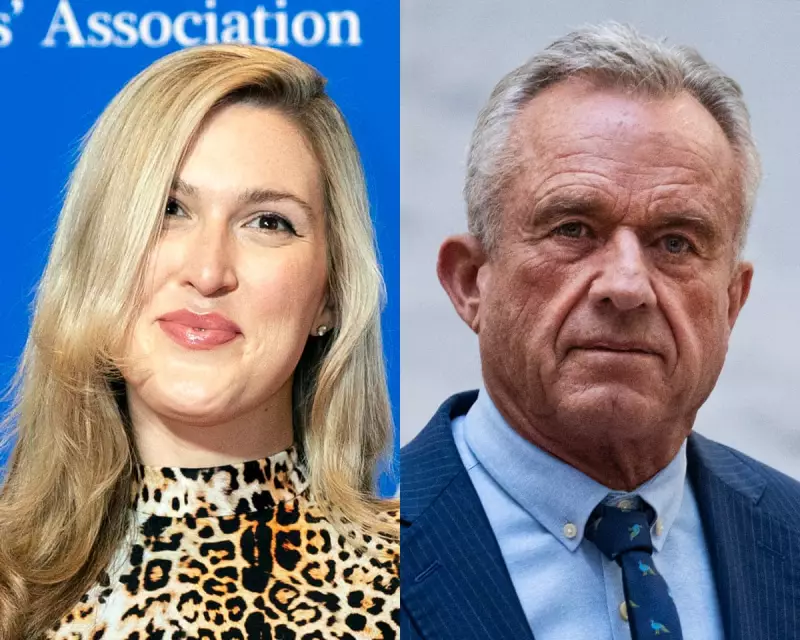
The American media landscape is currently gripped by an unfolding scandal involving prominent political reporter Olivia Nuzzi and her revelations about an alleged emotional affair with Robert F Kennedy Jr, the US health secretary. The controversy has escalated into a public mudslinging match with her former fiancé, exposing deep concerns about journalistic ethics and public trust.
The Unfolding Drama: Memoirs and Accusations
This week saw the release of excerpts from Olivia Nuzzi's memoir, American Canto, where she detailed what she describes as an emotional affair with Robert F Kennedy Jr, whom she refers to as "the politician". The 32-year-old journalist, known for her access to Republican figures, claimed the now health secretary told her he would "take a bullet" for her and soothed her concerns about his reported brain worm by saying, "Baby, don't worry."
Not to be outdone, Nuzzi's ex-fiancé Ryan Lizza, a former Politico correspondent, published his own essay detailing the day he discovered Nuzzi was allegedly cheating on him with another former presidential candidate, Mark Sanford. Lizza used the metaphor of invasive bamboo growing behind their Georgetown townhouse to describe Nuzzi's secrecy in concealing the alleged affair.
Media Circus and Ethical Concerns
The very public airing of dirty laundry between two prominent journalists comes at a time when trust in the US press has hit an all-time low. A recent Gallup poll revealed that just 28% of respondents expressed a "great deal" or "fair amount" of trust in newspapers, television and radio to report news fairly and accurately. This represents a significant drop from 31% in 2024 and 40% five years ago.
Patrick R Johnson, an assistant professor of journalism at Marquette University, warned that the scandal could have wider repercussions. "Journalism has a trust problem, and the fact that all this dirty laundry is getting aired is not going to help that," he said. "Because two people with significant followings are behaving in this way, other people are going to make assumptions that more journalists are behaving this way."
Career Histories and Previous Controversies
Olivia Nuzzi first gained attention as an intern in Anthony Weiner's 2013 mayoral campaign, publishing an account of her experience in the New York Daily News. She leveraged this into a staff position at the Daily Beast while still an undergraduate at Fordham University. Her career trajectory included covering Trump's political rise and serving as New York magazine's first Washington DC correspondent.
Nuzzi left New York magazine when her entanglement with RFK Jr, which violated the publication's standards around conflicts of interest, was revealed shortly before the election. She acknowledged the relationship "should have been disclosed to prevent the appearance of a conflict" and apologised to colleagues.
Ryan Lizza, 51, has his own controversial history, having been fired from the New Yorker in 2017 after a sexual misconduct allegation emerged during the early days of the #MeToo movement. He denied the claims and subsequently wrote for Esquire and Politico.
Broader Implications for Journalism
Mark Feldstein, chair of broadcast journalism at the University of Maryland and former investigative correspondent for CNN and ABC News, described the Nuzzi-Lizza story as "self-immolation on both their parts". He expressed concern that "this takes journalism self-branding to a crazy and extreme extent" and "certainly fuels the disdain that so many Americans have for journalists not being objective, not being neutral."
The scandal has reignited discussions about the trope of female journalists sleeping with sources, a narrative that has troubled Nuzzi herself. In 2015, she tweeted: "Why does Hollywood think female reporters sleep with sources?" As Moira Donegan wrote for the Guardian, revelations like those about Nuzzi and RFK Jr make it "harder" for the reporter's peers to do their jobs and "cast all female professionals under the suspicion of corruptibility and unseriousness".
Kennedy has denied Nuzzi's claims of a sexual or romantic relationship, stating they only met once for an interview. He is married to actor Cheryl Hines, who has her own memoir out this month. None of the parties involved responded to requests for comment, leaving the public with competing narratives and unanswered questions about the boundaries between personal relationships and professional journalism.





